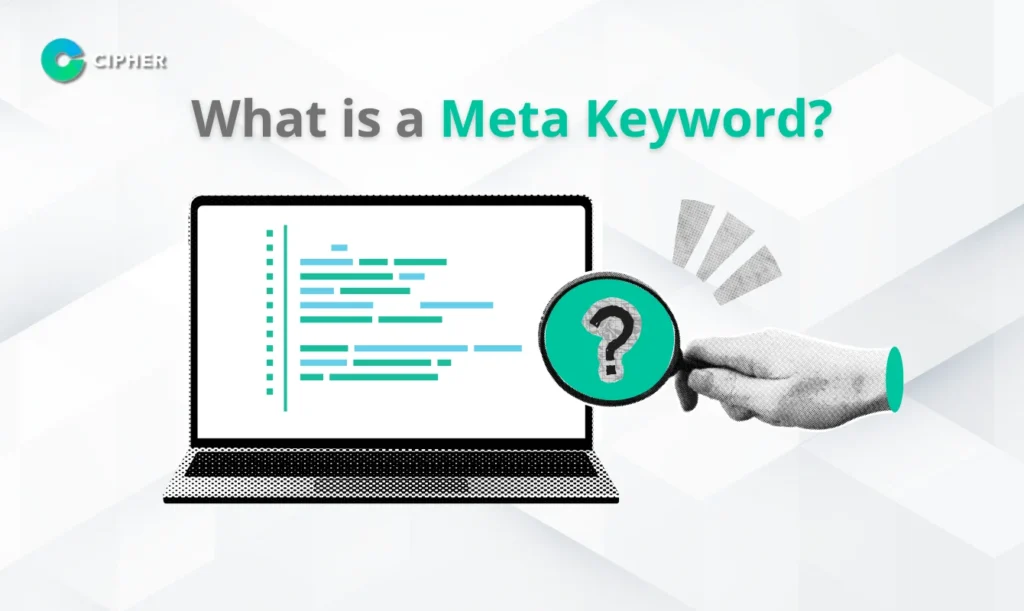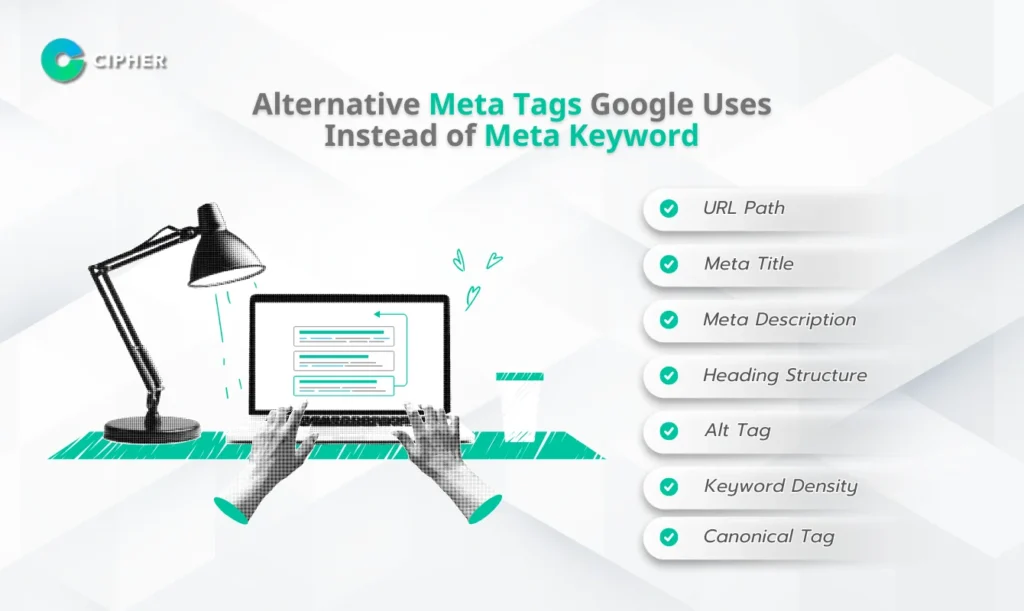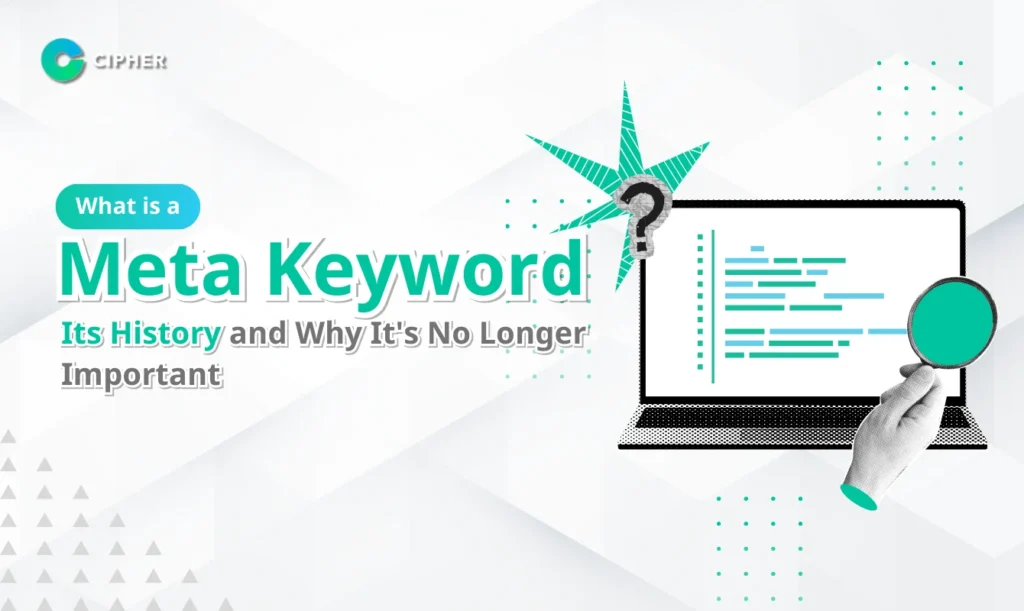In today’s digital landscape where SEO plays a crucial role in online business success, understanding the evolution of Meta Keyword practices is essential for web developers and marketers. While Meta Keyword once held significant importance in search engine optimization, modern SEO strategies have evolved far beyond this outdated technique. At Cipher, a leading web development and SEO consulting company, we help businesses navigate these complex changes and implement effective SEO strategies that deliver real results. Our comprehensive services ensure your website ranks higher in search results using current best practices rather than obsolete Meta Keyword methods.
Table of Contents
What is a Meta Keyword?

Meta Keyword refers to a specific HTML tag placed within a website’s source code that lists keywords or short phrases related to each web page’s content. This Meta Keyword tag was designed to inform search engines like Google about the relevant search terms associated with a particular webpage. In the past, search engines utilized Meta Keyword as one of the ranking factors for search results, giving websites with Meta Keyword tags matching user search queries better chances of ranking higher in search engine results pages.
The Meta Keyword tag follows a simple HTML format and was once considered an essential element of on-page SEO optimization. Website owners and SEO professionals would carefully select keyword meta Tags to optimize their pages for specific search terms, believing that proper Meta Keyword implementation would significantly impact their search rankings.
The Historical Background of Meta Keyword
During the early days of the internet, artificial intelligence and machine learning technologies were not as advanced as they are today. Search engines like Google relied heavily on Meta Keyword tags to understand what content each webpage contained and how it related to user search queries. This dependency made Meta Tag Keywords extremely popular among web developers and SEO practitioners who wanted to improve their search engine rankings.
However, as the internet grew exponentially and competition for top search positions intensified, many website owners began misusing Meta Keyword tags. The practice of keyword stuffing became widespread, where webmasters would insert numerous irrelevant keywords into their Meta Keyword tags, hoping to manipulate search rankings regardless of actual content relevance.
This abuse of Meta Keyword functionality led to poor search results quality, as websites with low-quality content but extensive Keywords Meta Tags often outranked genuinely valuable websites that used Meta Keyword tags more conservatively.
Why Did Google Stop Using Meta Keyword?
When the misuse of SEO Keyword Meta practices became prevalent, Google’s search results began failing to meet user expectations. Websites with poor content quality but excessive Meta Keyword optimization were ranking higher than genuinely helpful websites that used Keywords Meta Tags appropriately. This situation prompted Google to make a significant decision in 2009 to completely remove Meta Keywords from its ranking algorithm.
Google officially announced that Meta Keyword tags would no longer influence search rankings, citing widespread abuse and unfair manipulation of search results. The search giant recognized that relying on Meta Tag Keywords was creating an uneven playing field where content quality took a backseat to Meta Keyword manipulation tactics.
Since this landmark decision, Meta Keyword has had zero impact on SEO performance, making it an obsolete practice that modern SEO professionals should avoid.
How Does Google Identify Keywords Without Meta Keywords?
Modern Google algorithms examine keyword density within content, content categorization, website structure, and various other meta tags excluding the outdated Meta Keyword tag. These elements work together to provide Google with a comprehensive understanding of each webpage’s relevance to specific search queries.
Alternative Meta Tags Google Uses Instead of Meta Keyword

While Meta Keyword lost its relevance, several other meta tags continue to play crucial roles in helping search engines understand webpage content:
- URL Path: The website’s URL structure provides context about page content
- Meta Title: The page title that appears in search results and browser tabs
- Meta Description: A summary of page content displayed in search results
- Heading Structure: H1, H2, H3 tags that organize content hierarchy
- Alt Tag: Image descriptions that help search engines understand visual content
- Keyword Density: Natural keyword distribution throughout the content
- Canonical Tag: Specifies the primary URL for duplicate content issues
Google crawls these Website Keywords Meta elements to gather information for ranking purposes, ensuring search results match user intent more accurately than the old Meta Keyword system ever could.
Disadvantages of Using Meta Keywords in Modern SEO
Although Meta Keyword no longer affects Google rankings, many websites still include these tags in their HTML code. However, continuing to use Meta Keyword in modern SEO can create several disadvantages:
- Competitive Intelligence Risks: Competitors can easily view your source code and discover which keywords you’re targeting through your Meta Keywords Tags, potentially using this information to compete against you more effectively.
- Perceived Keyword Stuffing: Including excessive keywords in Meta Keyword tags might be interpreted as an attempt at keyword stuffing, which violates Google’s quality guidelines and could potentially harm your website’s reputation.
- Resource Waste: Time and effort spent on optimizing Meta Keywords could be better invested in proven SEO techniques that impact search rankings, such as content quality improvement and technical SEO optimization.
Cipher's Professional SEO Services for Modern Website Optimization
In today’s competitive online environment, having a website alone isn’t sufficient for business success. You need comprehensive SEO strategies that align with current search engine algorithms and user behavior patterns. Cipher’s expert team provides professional consultation and implementation services covering every aspect of modern SEO, from strategic planning to technical optimization.
Our specialists understand the evolution from outdated practices like Meta Keyword optimization to modern, effective SEO techniques that deliver sustainable results. Cipher offers comprehensive content marketing services, advanced on-page SEO optimization, and strategic off-page SEO campaigns designed to improve your website’s visibility and performance. Whether you need technical SEO audits, content strategy development, or complete SEO overhauls, our team has the expertise to help your business achieve its digital marketing goals through proven, white-hat SEO methodologies.
Conclusion
Meta Keyword represents a significant chapter in SEO history, serving as a primary method for websites to communicate their content relevance to search engines during the early Internet era. However, widespread abuse of the Keywords Tag functionality led Google to remove Meta Keywords from its ranking algorithm in 2009, making this practice completely obsolete for modern SEO. Today’s successful SEO strategies focus on creating high-quality content, optimizing essential meta tags like titles and descriptions, and implementing comprehensive technical SEO improvements. Instead of relying on outdated SEO keyword techniques, businesses should prioritize user experience, content value, and modern optimization practices that search engines consider when determining rankings.
Frequently Asked Questions
What is a Meta Keyword?
Meta Keyword is an HTML tag placed in a website’s source code that lists keywords or phrases related to the webpage’s content. This tag was historically used to inform search engines about the page’s relevant search terms, but it no longer affects search rankings since Google discontinued its use in 2009.
Why did Google stop using Meta Keyword?
What are examples of meta tags that still matter?
Important meta tags for modern SEO include:
- Title Tag: Defines the page title shown in search results
- Meta Description: Provides a brief content summary for search results
- Canonical Tag: Specifies the preferred URL for duplicate content
- Alt Tag: Describes images for search engine understanding
- Robots Meta Tag: Instructs search engines on how to crawl and index pages
These tags continue to help search engines understand and properly display website content in search results.
Does Meta Keyword still affect SEO today?
No, Meta Keyword has no impact on modern SEO because:
- Google officially removed it from ranking factors in 2009
- Historical misuse through keyword stuffing damaged its credibility
- Using Meta Keyword today may reveal keyword strategies to competitors
- Modern search engines rely on content quality, user experience, and other technical factors instead of the Keywords Meta for ranking decisions.





